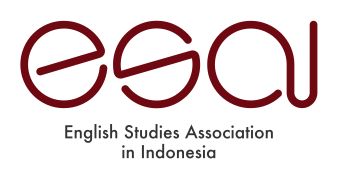Post Editing: Suggestions for Translation Courses Sub-Content
Abstract
The practice of post-editing has become so common these days with to the introduction of Machine Translation (MT). Because of that, the author believes post-editing should be included in all types of translation activities. Subsequently, in the teaching of translation, post editing should be considered as one of the course to be taught. In translation teaching, however, especially in Indonesia, post-editing has not yet been discussed specifically. Most post-editing activities in the classroom in Indonesia is not taught specifically as one of the courses as a part of a minor. Rather, they are integrated as a sub-course of a particular course, such as literary translation. In this research, I would like to propose several inputs which can be considered when teaching post- editing as a part of a bigger course. This research is conducted by reflecting on the actual process of post-editing conducted by the researcher when translating a text. It is expected that the result of the research is to be used by translation trainers, teachers, and practitioners in training their students.
Keywords: Post-editing, translation course, sub-course
Full Text:
PDFReferences
Carl, M., Dragsted, B., Elming, J., Hardt, D., & Jakobsen, A. L. (August, 2011). The process of post-editing: A pilot study. In Sharp, B., Zock, M., Carl, M., & Jakobsen, A.L. (Eds.), Human-machine interaction in translation: The 8th International NLPSC Workshop, Copenhagen, Denmark: Proceedings, (pp. 131-142). Retrieved from https://pure.au.dk/ws/files/96479802/sharp_Zock_Carl_Jakobsen_2011_Proceedings_of_the_8th_NLPCS_Workshop.pdf
Englund Dimitrova, B. (2005). Expertise and explicitation in the translation process. Amsterdam/Philadelphia: John Benjamins Publishing Company.
Koby, G. S. (2001), Editor’s introduction. In Krings, H. P. Repairing Texts: Empirical Investigations of Machine Translation Post-editing Processes (pp. 1-23). Kent, Ohio: Kent State University Press.
Koponen, M. (2016). Machine translation post-editing and effort: Empirical studies on the post-editing process (Doctoral dissertation, University of Helsinki, Helsinki, Finland). Retrieved from https://www.researchgate.net/publication/299345651_Machine_Translation_Post-editing_and_Effort_Empirical_Studies_on_the_Post-editing_Process
Krings, H. P. and Koby, G. S. (Eds.). (2001). Repairing texts: Empirical investigations of machine-translation post-editing processes. Kent, Ohio: Kent State University Press.
Krings, H. P. (2001). Repairing texts: Empirical investigations of machine translation post-editing process. Kent, Ohio: Kent State University Press.
Lambert, J. (2013, April 19). Talking translation – Reflecting on reflective practice [Blog Post]. Retrieved from https://jaltranslation.com/2013/04/19/talking-translation-reflecting-on-reflective-practice/
Nida, E. A., & Taber, C. R. (1969). The Theory and Practice of translation. Leiden, Netherland: Brill.
O’Brien, S. (November, 2002). Teaching Post-editing, a proposal for course content. In Teaching machine translation: The 6th International Workshop of the European Association for Machine Translation, Manchester, England: Proceedings, (pp. 99 – 106). Retrieved from http://www.mt-archive.info/00/EAMT-2002-OBrien.pdf
O'Curran, E. (October, 2014). Machine translation and post-editing for user generated content: An LSP perspective. In O’Brien, S., Simard, M., & Specia, L. (Eds.), Post-editing technology and practice: The 11th Conference of the Association for Machine Translation in the Americas, Vancouver, BC: Proceedings, (pp. 113 – 118). Retrieved from http://www.mt-archive.info/10/AMTA-2014-W2-OCurran.pdf
Perum Jamkrindo. (on progress). 2018 annual report. Retrieved from http://www.jamkrindo.co.id/dokumen/laporan_tahunan.
Schäffner, C. (2016). An integrated approach to translator education:
Didactic challenges. [PowerPoint slides]. Retrieved from https://slideplayer.com/slide/10448701/
DOI: http://dx.doi.org/10.30813/jelc.v9i2.1688
Refbacks
- There are currently no refbacks.



2.jpg)



